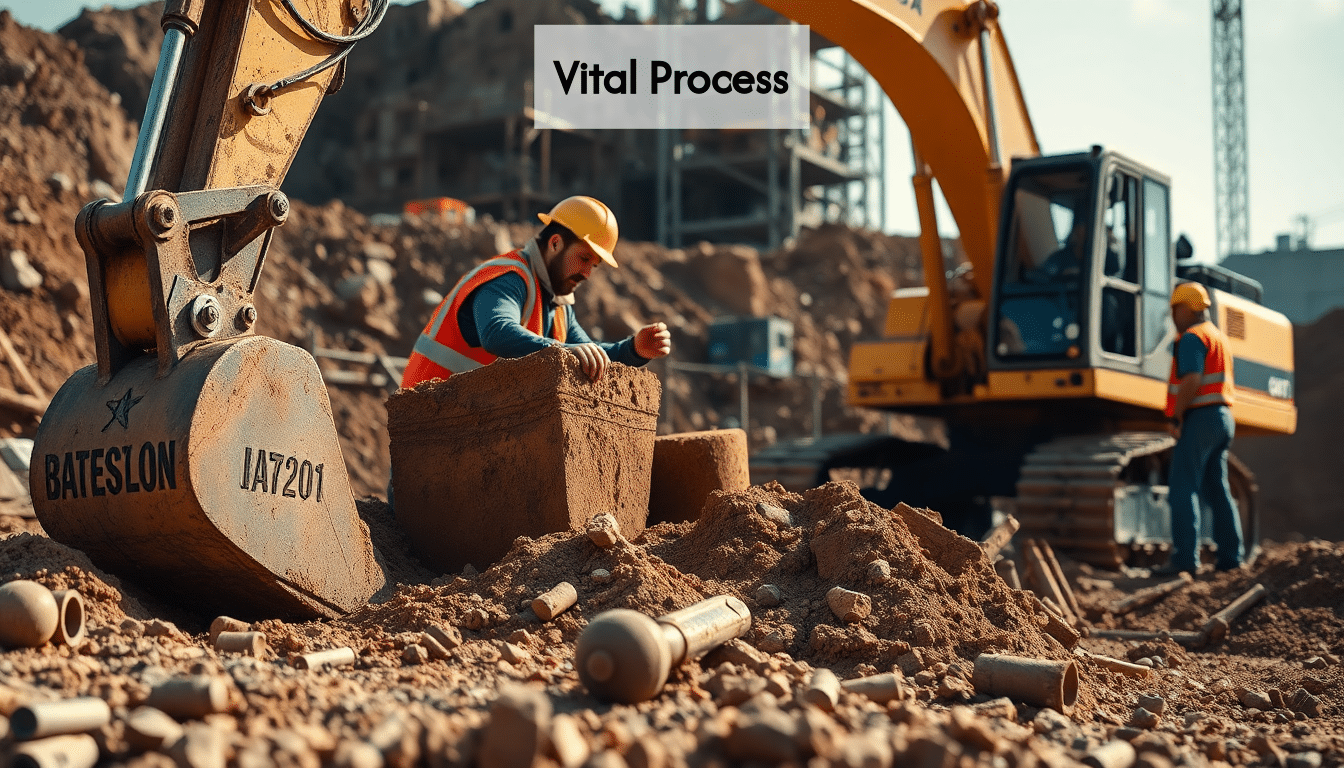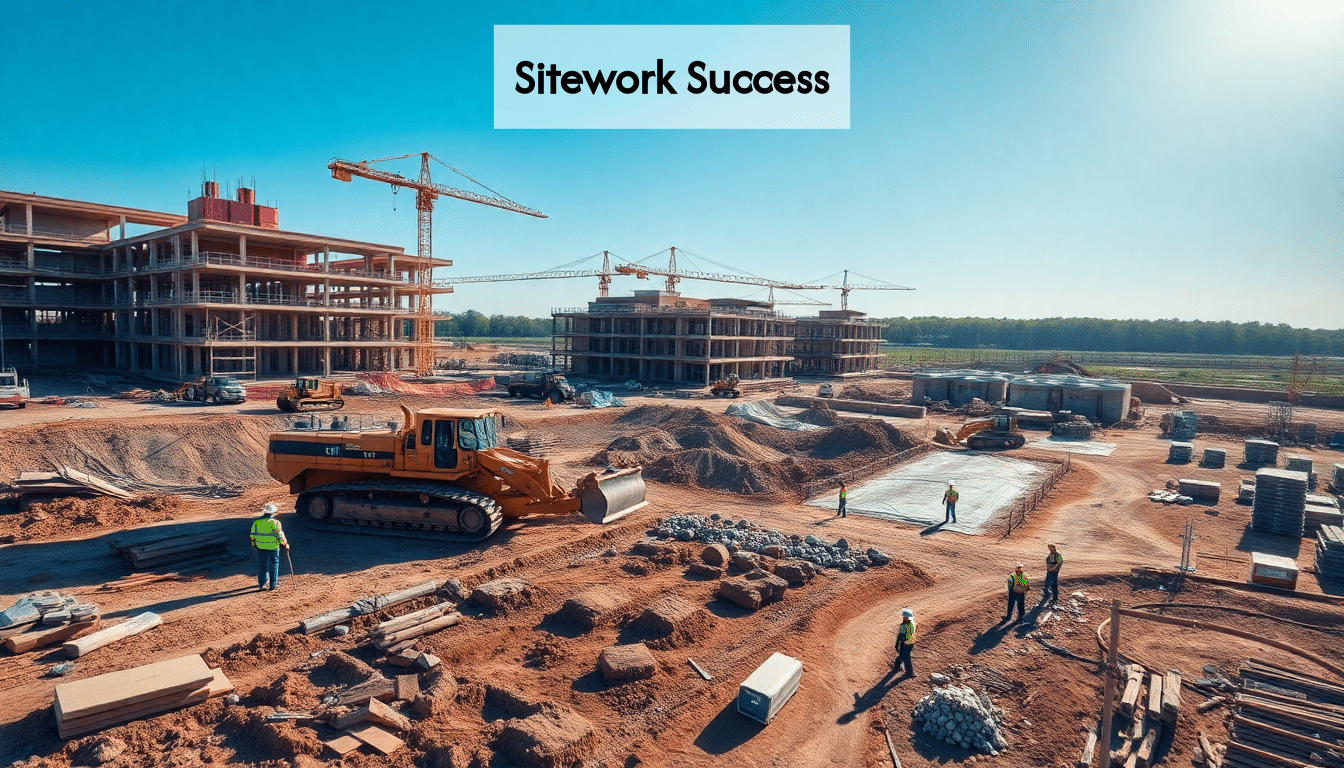Sitework is the unsung hero of construction projects, quietly laying the groundwork for what’s to come. Without it, even the most ambitious architectural plans can collapse like a house of cards. But here’s the catch—the success of your project hinges not just on the grand designs but on the nitty-gritty details of site preparation. Neglect this phase, and you risk spiraling costs and delayed timelines.
Sitework Overview and Definitions
Sitework represents the foundation phase of construction projects that prepares the land before building structures can begin. This critical preliminary stage encompasses all activities necessary to transform raw land into a construction-ready site.
What Is Sitework in Construction?

Sitework in construction refers to the comprehensive preparation of a construction site, including earthwork operations, utility installations, and site improvements that create the foundation for subsequent building activities. The term “sitework” (sometimes written as “site work”) covers a broad spectrum of construction activities that must occur before vertical construction can commence.
According to VERTEX Engineering, earthwork—a major component of sitework—is frequently underestimated in project budgeting despite its crucial importance to development projects.
Core Components of Sitework
- Site Clearing and Demolition
- Removal of existing structures, vegetation, and debris
- Environmental protection measures during clearing operations
- Earthwork Operations
- Excavation (cut): Removing soil from high areas
- Embankment (fill): Adding soil to low areas
- Grading: Creating proper elevations and slopes for drainage
- Underground Utilities
- Installation of water, sewer, gas, and electrical systems
- Stormwater management structures implementation
- Site Improvements
- Roadways, parking areas, and sidewalks construction
- Landscape elements and final site finishing
Sitework quality directly impacts every subsequent construction phase, making it a critical determinant of overall project success. Properly executed sitework prevents costly issues like improper drainage, unstable foundations, and utility conflicts that could emerge during later stages of construction.
Key Takeaways
| Takeaway | Explanation |
|---|---|
| Sitework is critical to project success | Proper execution of sitework directly affects all subsequent phases of construction, preventing costly issues later. |
| Thorough planning is essential | Effective sitework begins with a comprehensive site assessment that identifies potential challenges and creates a solid foundation for the project. |
| Budgeting must account for variability | Sitework costs can vary significantly due to site conditions, earthwork needs, and utilities, making accurate budgeting crucial. |
| Regulatory compliance is mandatory | Understanding and managing the permitting process are vital to avoid delays and ensure project timelines are met. |
| Safety practices reduce risks | Implementing robust safety protocols and fostering a safety culture are essential for protecting workers and enhancing productivity. |
Planning and Preparing Construction Sites

Effective sitework begins with thorough planning and preparation. This phase lays the groundwork for all subsequent construction activities and directly impacts project timelines, budgets, and outcomes.
Site Assessment and Evaluation
Before any physical work begins, a comprehensive site assessment is essential. This evaluation identifies potential challenges and opportunities that will influence the sitework approach.
Key assessment components include:
- Topographical Surveys
- Mapping existing elevations and terrain features
- Identifying natural drainage patterns and water bodies
- Geotechnical Investigations
- Soil testing to determine composition and bearing capacity
- Evaluation of groundwater conditions and potential soil contamination
- Environmental Studies
- Wetland delineation and protected habitat identification
- Historical use assessment to identify potential contamination
According to Perlo Construction, a thorough site assessment that evaluates soil composition, drainage patterns, and potential environmental impacts is crucial before beginning any construction activity.
Creating a Sitework Plan
Following assessment, a detailed sitework plan must be developed that outlines:
- Phasing Schedule: Sequencing of sitework activities
- Earthwork Strategy: Cut and fill calculations, material management approaches
- Erosion Control Measures: Methods to prevent soil loss and water contamination
- Utility Coordination: Planning for existing and new utility installations
- Access and Staging: Designation of construction entrances and material storage areas
Permitting and Compliance
Sitework typically requires several permits before work can begin:
| Permit Type | Purpose | Typical Timeline |
|---|---|---|
| Grading Permit | Authorizes earthmoving activities | 2-6 weeks |
| SWPPP | Controls stormwater runoff | 3-8 weeks |
| Tree Removal | Allows clearing of protected vegetation | 1-4 weeks |
| Utility Permits | Enables connection to public services | 4-12 weeks |
These timeframes can vary significantly based on local regulations and project complexity. Permit delays represent one of the most common causes of sitework schedule disruptions, making early application critical for project success.
Properly executed planning minimizes unforeseen conditions, reduces potential change orders, and creates a solid foundation for the entire construction process.
Frequently Asked Questions
What is sitework in construction?
Sitework in construction refers to the comprehensive preparation of a construction site, which includes earthwork operations, utility installations, and site improvements, essential for readying land for building activities.
Why is sitework important for a construction project?
Sitework is critical because it directly impacts the success of the project by preventing costly issues such as drainage problems, unstable foundations, and utility conflicts that may arise later in the construction phases.
What are the main components of sitework?
The main components of sitework include site clearing and demolition, earthwork operations, underground utilities installation, and site improvements like the construction of roadways and landscaping.
How do I prepare for sitework?
Preparing for sitework involves conducting a thorough site assessment, creating a detailed sitework plan, and ensuring all necessary permits are obtained to avoid delays and compliance issues.
Build Your Future with the Right Talent
Sitework may lay the foundation for successful construction projects, but what about your workforce? Poor hiring decisions can disrupt your entire project timeline, just like neglected site preparation can compromise structural integrity. Are you struggling to find skilled professionals who can tackle essential sitework components—like earthwork operations and utility installations—efficiently? You are not alone!

At Amundson Group, we understand the challenges of recruiting top talent in the construction industry. Imagine quickly filling critical roles in heavy civil, site development, and more with exceptional candidates who can hit the ground running. We specialize in connecting construction companies like yours with the right skills, ensuring your site prep phases are executed flawlessly and on schedule. Ready to say goodbye to hiring headaches? Visit Amundson Group today and take the first step towards building a more efficient and successful project team!





